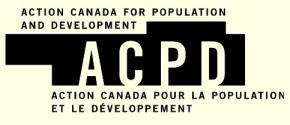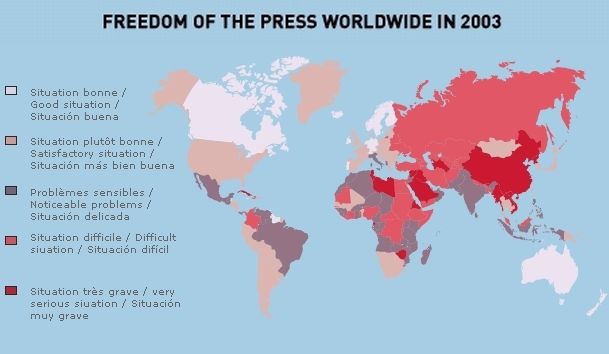Guy Giard
Art Contemporain
|
Slavery in 2003
L'esclavage en 2003
An essential read!!!
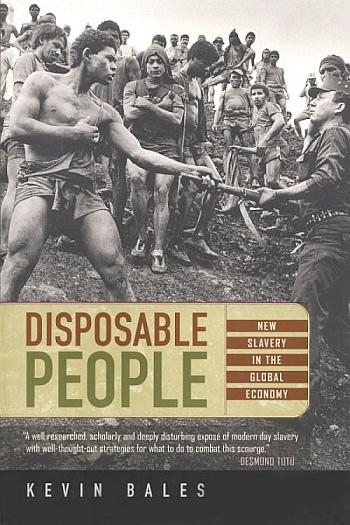 The horror of slavery, says Kevin Bales, is "not confined to history." It is not only possible that slave labor is responsible for the shoes on your feet or your daily consumption of sugar, he writes, the products of forced labor filter even more quietly into a broad portion of daily Western life. "They made the bricks for the factory that made the TV you watch. In Brazil slaves made the charcoal that tempered the steel that made the springs in your car and the blade on your lawnmower.... Slaves keep your costs low and returns on your investments high."
The exhaustive research in Disposable People shows that at least 27 million people are currently enslaved around the world. Bales, considered the world's leading expert on contemporary slavery, reveals the historical and economic conditions behind this resurgence. From Thailand, Mauritania, Brazil, Pakistan, and India, Bales has gathered stories of people in unthinkable conditions, kept in bondage to support their owners' lives. Bales insists that even a small effort from a large number of people could end slavery, and devotes a large chapter to explaining the practical means by which this might be accomplished. "Are we willing to live in a world with slaves?" he asks. As a sign of his commitment, all his royalties from Disposable People will go toward the fight against slavery. Kevin Bales is a Principal Lecturer at the Roehampton Institute, University of Surrey, England, and the world's leading expert on contemporary slavery.
From Kirkus Reviews:
A numbing indictment of our blindness to the new forms of slavery engendered by the global economy. Bales, a leading authority on this subject (Univ. of Surrey, England), defines slavery, quite specifically, as the ``total control of one person by another for the purpose of economic exploitation.'' The control is facilitated by violence and the foreclosure of personal freedom. He estimates, given this definition, that there are approximately 27 million slaves currently held in the world economy. One of the more virulent characteristics of this new slavery is a tendency to view slaves as relatively short-term investmentsreplacement is often cheaper than maintenance, thus the slaveholders will extract as much labor as possible, even if it means their victims will only last for several years of bondage. New slaveholders in the world economy also frequently insulate themselves against prosecution by maintaining fraudulent work contracts. Bales opens his essay with the story of Seba, a woman brought to France from Mali to serve as a house slave, but the book focuses primarily upon slavery in the third world. He describes the plight of child prostitutes in Thailand, slaves born under control of the White Moors in Mauritania, charcoal workers in Brazil, brick kiln operators in Pakistan, bonded farmers in India, and prisoners of war in Burma. He provides both personal accounts from the lives of individual slaves, and an overview of legal, political, and historical factors which influence the particular manifestation of slavery in a given locality. Bales makes a convincing argument that the new forms of slavery are directly related to trends in the global economy, and that opposition to slavery must also take the form of an international, global awareness of the situation. A powerful expos of the dirty little secret of the global village.
Copyright ©1999, Kirkus Associates, LP. All rights reserved.
|
Publiés par:  http://www.ecosociete.org/
http://www.ecosociete.org/
 http://www.ecosociete.org/
http://www.ecosociete.org/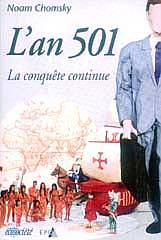 Ce livre tente de jeter un regard clairvoyant sur les 500 ans de la conquête européenne du monde, depuis l'arrivée de Colomb en Amérique le 12 octobre 1492. Alors que les États-Unis ont pris le relais de l'hégémonie mondiale depuis bientôt 50 ans, force nous est de constater que la conquête continue.
Chomsky offre au lecteur une analyse rigoureuse et incisive de la conjoncture actuelle. Il démontre combien les principes et les idéaux mis de l'avant par les chefs d'État ont peu à voir avec la réalité de leur politique étrangère de domination et d'exploitation. Il dénonce aussi la pratique constante de la désinformation qui empêche toute démocratie véritable.
Voici un livre important pour tous ceux qui se croient fous lorsqu'ils mesurent l'abîme qui sépare leur vision du monde de celle que présentent les médias et la classe dirigeante.
Françoise Patenaude
|
 L'auteur nous introduit dans les coulisses du gouvernement américain, où se trament chaque jour de véritables machinations destinées à asseoir l'impérialisme américain.
Partout dans le monde, les Américains s'affairent minutieusement à écraser toute velléité populaire de constituer des mouvements de travailleurs fondés sur la solidarité. Seuls sont encouragés et entretenus les gouvernements qui répondent adéquatement aux intérêts économiques états-uniens.
Mais le gouvernement des États-Unis ne peut réussir à poursuivre cette politique étrangère qu'en dupant sa propre population. Il le fait avec la complicité des médias, par l'usage systématique d'un double langage.
|
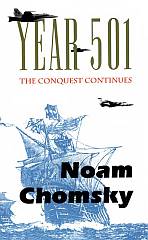 Year 501: The Conquest Continues Year 501: The Conquest ContinuesWith chapters on Haiti, Latin America, the new global economic order, the Third World at home, and much more, this is a powerful treatise on the not-so-new world order. "Year 501 is another awesome achievement by Noam Chomsky.
It is a devastating array of information about the U.S. role in the world, placed in the long historical perspective of 500 years that followed the voyages of Columbus. The result is a wonderful single-volume education in history and world politics."
-Howard Zinn
|
 The book focuses on the idea that the United States has for decades opposed the development of governments and economies in the Third World that are ideologically different from our own, particularly when such governments and economies improve the quality of life for the masses. Chomsky argues that such opposition is, in fact, the sum of all U.S. foreign policy. The book focuses on the idea that the United States has for decades opposed the development of governments and economies in the Third World that are ideologically different from our own, particularly when such governments and economies improve the quality of life for the masses. Chomsky argues that such opposition is, in fact, the sum of all U.S. foreign policy. For example, Chomsky points out that when El Salvador in the 1970s experienced a growth of "peasant associations, cooperatives, unions" and similar socialist-type organizations, the U.S. moved right in to radically destabilize the government by installing our own dictators who suppressed the population using repression, torture, and murder.
|
COLORS Magazine #53
-- in association with Anti-Slavery International --
has dedicated its December/January issue to slavery.
The magazine presents striking visual images of slavery today.
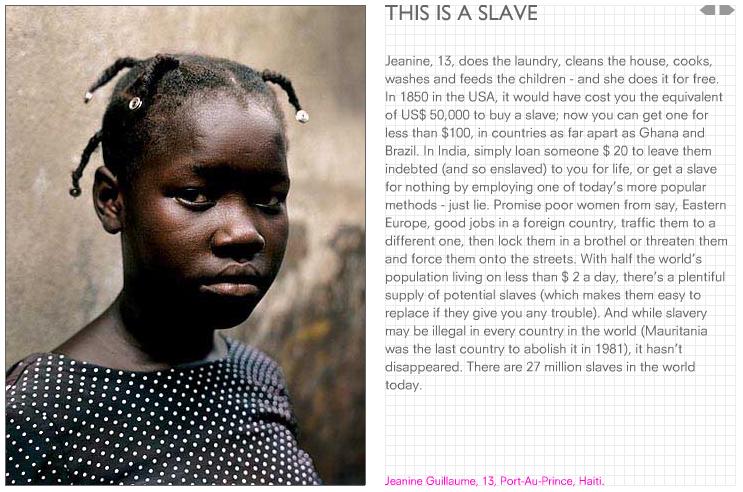



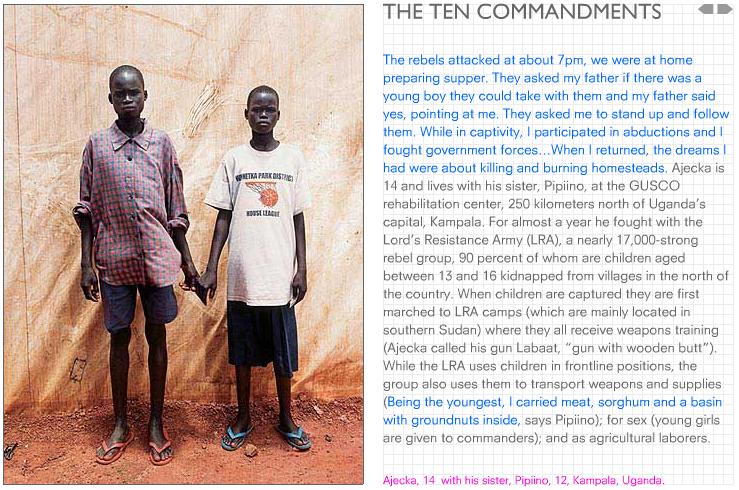
|
Anti-Slavery International is the world's oldest international human rights organisation, founded in 1839. It is the only charity in the United Kingdom to work exclusively against slavery and related abuses. We work at local, national and international levels to eliminate the system of slavery around the world by:
What is modern slavery?
For many people, this is the image that comes to mind when they hear the word slavery. We think of the buying and selling of people, their shipment from one continent to another and the abolition of the trade in the early 1800s. Even if we know nothing about the slave trade, it is something we think of as part of our history rather than our present. But the reality is slavery continues TODAY.
Millions of men, women and children around the world are forced to lead lives as slaves. Although this exploitation is often not called slavery, the conditions are the same. People are sold like objects, forced to work for little or no pay and are at the mercy of their 'employers'. Women from eastern Europe are bonded into prostitution, children are trafficked between West African countries and men are forced to work as slaves on Brazilian agricultural estates. Contemporary slavery takes various forms and affects people of all ages, sex and race.
What is slavery?
Common characteristics distinguish slavery from other human rights violations. A slave is:
What types of slavery exist today?
Bonded labour affects at least 20 million people around the world. People become bonded labourers by taking or being tricked into taking a loan for as little as the cost of medicine for a sick child. To repay the debt, they are forced to work long hours, seven days a week, 365 days a year. They receive basic food and shelter as 'payment' for their work, but may never pay off the loan, which can be passed down through several generations.
Forced labour affects people who are illegally recruited by governments, political parties or private individuals, and forced to work - usually under threat of violence or other penalties.
Worst forms of child labour refers to children who work in exploitative or dangerous conditions. Tens of millions of children around the world work full-time, depriving them of the education and recreation crucial to their personal and social development.
Commercial sexual exploitation of children. Children are exploited for their commercial value through prostitution, trafficking and pornography. They are often kidnapped, bought, or forced to enter the sex market.
Trafficking involves the transport and/or trade of humans, usually women or children, for economic gain using force or deception. Often migrant women are tricked and forced into domestic work or prostitution.
Early and forced marriage affects women and girls who are married without choice and are forced into lives of servitude often accompanied by physical violence.
Traditional or 'chattel' slavery involves the buying and selling of people. They are often abducted from their homes, inherited or given as gifts.
|
|
Trafficking: reliable statistics are unavailable for this largely unreported crime. However, recent studies tell us that:
------------------------------------------------
|
|
Par millions. A nos portes ou à l'autre bout du monde, des esclaves travaillent et suent et souffrent. En silence et dans l'indifférence. Des esclaves ont peut être cousu les chaussures que vous portez ou tissé le tapis que vous foulez. Des enfants sans enfance fabriquent les jouets de nos enfants.
La France, comme tous les pays riches, n'est pas épargnée par ce fléau. Pourtant vous ne serez probablement jamais confronté à l'esclavage car il se dissimule derrière des façades cossues ou des pavillons anodins. Chaque jour, des milliers de jeunes domestiques asiatiques et africaines sont asservies près de chez nous. Privées de leurs papiers d'identité, astreintes à 15, 18, ou 21 heures de labeur quotidien, sept jours sur sept, non rémunérées ou si peu, ces jeunes femmes - ces enfants - sont parfois battues et abusées sexuellement. Les esclavagistes sont nantis ou modestes, diplomates ou simples citoyens.
Sans parler de la servitude pour dette qui n'est pas l'apanage des pays du sud. En France, des dizaines de milliers de jeunes étrangers suent dans des ateliers clandestins de confection et de maroquinerie ou sur des chantiers de travaux publics, pris au piège d'une dette exorbitante contractée pour prix de leur passage.
Fondé en 1994 par Dominique Torrès, journaliste à France 2, le Comité Contre l'Esclavage Moderne (CCEM) a pour objectif premier de lutter contre toutes formes de servitude, d'assister, et de libérer s'il y a lieu, les victimes de l'esclavage.
Secondo l'Organizzazione Internazionale del Lavoro, nel mondo oggi ci sarebbero tra i 200 e i 250 milioni di schiavi, cioè molti di più che nel corso dei tre secoli di tratta negriera.
Cinquant'anni fà, i redattori della Dichiarazione Universale dei Diritti Umani, riuniti a Parigi nel Palazzo Chaillot, consideravano la lotta contro la schiavitù come una priorità, proclamando: "Nessuno sarà tenuto in schiavitù, nè in servitù: sono vietati la schiavitù e la tratta degli schiavi in tutte le loro forme"
Il 6 marzo 1996 alcuni giornalisti liberano Mehret, una giovane eritrea, tenuta sotto sequestro nella casa parigina di un diplomatico. Tutti i giornali e la televisione ne parlano. Per la prima volta i francesi scoprono che anche nel XX secolo e sotto casa la schiavitù esiste. Babou, Joséphine, Véronique, Mehret, Ahmed o Asseguedech... condividono la stessa sorte: sono schiavi. Attualmente in Francia e in Europa, vivono uomini e donne che lavorano anche 20 ore al giorno, che soffrono la fame e sono maltrattati, che sono tenuti in segregazione dai loro datori di lavoro e, in generale, non percepiscono uno stipendio, nè hanno documenti d'identità per poter far valere i loro diritti.
|
|
Reporters sans frontières
Alors que plus d'un tiers de la population mondiale vit dans un pays où il n'existe aucune liberté de la presse, Reporters sans frontières œuvre au quotidien pour que l'information reprenne ses droits. En 2001, 31 professionnels des médias ont perdu la vie alors qu'ils travaillaient pour nous informer. Actuellement, plus de 120 journalistes sont emprisonnés dans le monde pour avoir simplement voulu exercer leur métier. Au Népal, en Érythrée ou en Chine, un journaliste peut passer plusieurs années en prison pour un mot ou une photo. Parce qu'emprisonner ou tuer un journaliste, c'est éliminer un témoin essentiel et menacer le droit de chacun à l'information, Reporters sans frontières mène son combat depuis plus de 17 ans.
Con Reporteros Sin Fronteras
Reporteros Sin Fronteras, una asociación reconocida como de utilidad pública Cuando más de un tercio de la población mundial vive en países en los que no existe ninguna libertad de prensa, Reporteros Sin Fronteras actúa a diario para que la información recupere sus derechos. En 2001, 31 profesionales de los medios de comunicación perdieron la vida mientras trabajaban para informarnos. Actualmente, más de 120 periodistas se encuentran encarcelados en todo el mundo, simplemente por haber cumplido con su obligación. En Nepal, en Eritrea o en China, un periodista puede pasar varios años en la cárcel, por una palabra o por una foto. Porque encarcelar o matar a un periodista significa eliminar a un testigo esencial y amenazar al derecho de todos a la información, Reporteros Sin Fronteras lleva a cabo su combate desde hace más de 17 años.
Reporters Without Borders
More than a third of the world's people live in countries where there is no press freedom. Reporters Without Borders works constantly to restore their right to be informed. Thirty-one media professionals lost their lives in 2001 for doing what they were paid to do -- keeping us informed. Today, more than 120 journalists around the world are in prison simply for doing their job. In Nepal, Eritrea and China, they can spend years in jail just for using the "wrong" word or photo. Reporters Without Borders believes imprisoning or killing a journalist is like eliminating a key witness and threatens everyone's right to be informed. It has been fighting such practices for more than 17 years. Defending press freedom… every day
|
|
Le groupe Amnistie internationale de l'Université du Québec à Montréal existe depuis 1980
Nos objectifs sont:
- Sensiliser et informer la population en général et la population étudiante de l'UQAM
en particulier sur les questions relatives aux droits de la personne;
- Mobiliser le plus grand nombre de personne possible à agir pour le respect de ces droits;
- Travailler à la libération de prisonniers et prisonnières d'opinion,
contre la torture et autres mauvais traitements, ainsi que contre la peine de mort;
- Agir pour le respect des droits de la personne, par l'envoi de lettres, pétitions, organisation d'activités diverses.
Ils organisent régulièrement des conférences ouvert au grand public.
On peut être mis au courrant de leurs activitées en s'abonnant
à leur lettre d'information: http://www.er.uqam.ca/nobel/amnistie/
|
"TRIUMPH over Life's Adversities
and set in motion YOUR LIFE'S PURPOSE!"
GUY GIARD, CHP, CLYL, MFA
Author, Speaker, Consultant

Soon in English, French and Spanish
Print and eBook
Sign up today for the Pre-Launch Newsletter
and be the first to receive your copy!
Guy Giard Keynotes and Workshops
For information
By telephone (514) 989-2350

